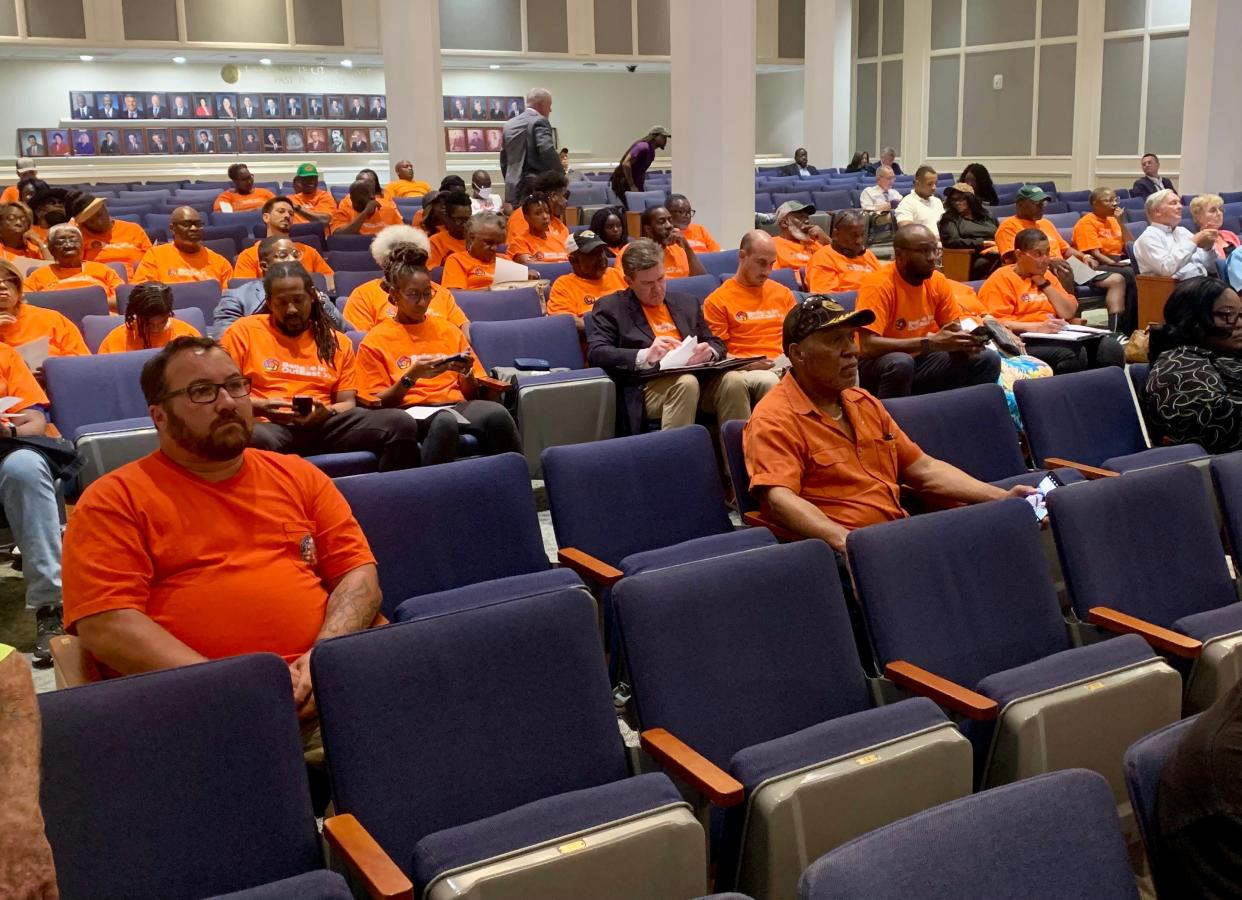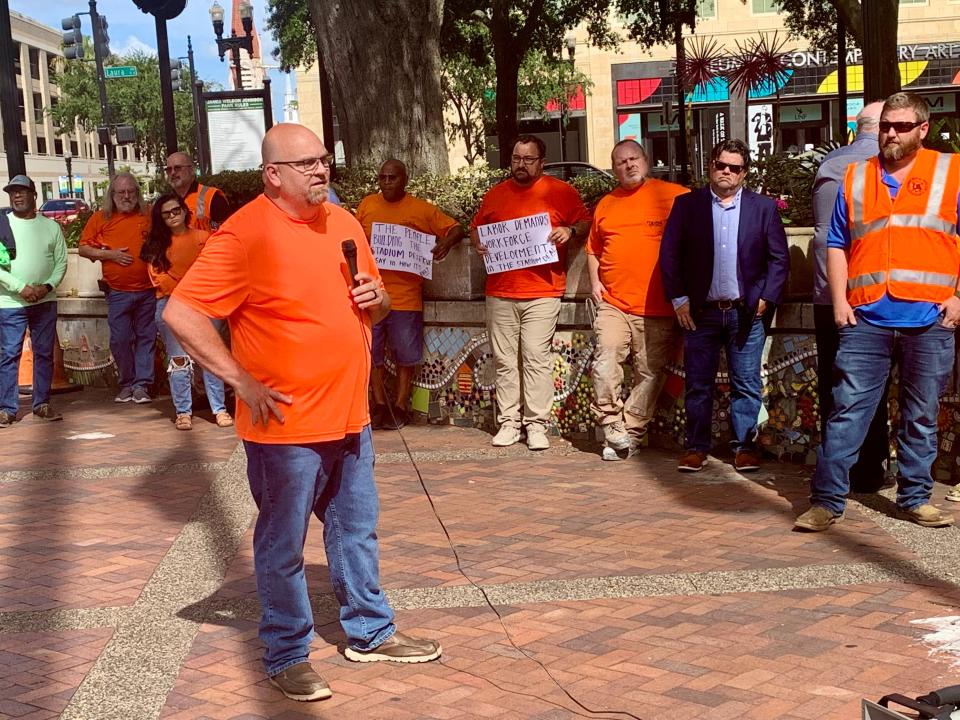City Council hears lopsided support for community benefits agreement in public hearing

Teal is the Jaguars team color but at a public hearing Monday on a proposed stadium deal, there wasn't a Jaguars jersey in sight and the color of choice was orange for people who urged City Council to keep intact a $300 million community benefits agreement.
Supporters of revitalizing the historic Eastside neighborhood next to the sports complex took turns at the podium at the three-hour public hearing while wearing orange shirts emblazoned with "Believe in OutEast." The North Florida Central Labor Council turned out union members in orange shirts with "Building Better Communities" printed on them.
The groups didn't coordinate the shirt colors, but the orange splashed across the audience carried the evening when it came to sounding off on the stadium deal negotiated by Mayor Donna Deegan and the Jaguars.
"I implore you — let's be on the right side of history," said Rev. Christopher McKee Jr. of First Baptist Church of Oakland, an Eastside neighborhood institution for 145 years. "Let's do what's going to benefit not only OutEast, but the entire city."
A smaller number of people asked City Council to reject the proposed deal outright or raised questions about whether it makes financial sense for taxpayers.
Mandarin resident Doug Dulaney said the Jaguars "are just a private football entertainment business that pays players a lot of money who, I think, often play badly" with a goal of maximizing profits for team owner Shad Khan.
He said the city has more pressing needs and council members shouldn't agree to pay anything more for the Jaguars but "since everybody seems to be under the spell of the Jaguars, you probably will."
So far, City Council members have not raised any deal-killing objections to the terms negotiated by Deegan for $1.4 billion of work on city-owned EverBank Stadium. The city would pay $775 million and Khan would pay the rest. Khan also would take sole responsibility for paying cost overruns.
The main conflict between council members and Deegan has been the separate community benefits agreement that is part of the overall stadium bill she filed.
Change would carve out city's money for Eastside from stadium bill
People wearing orange T-shirts will probably need to keep them on hand for future meetings because City Council president-designate Randy White said he intends to offer an amendment that would carve out the city's portion of funding for affordable housing, reducing homelessness and workforce development from the stadium legsilation.

The Deegan administration was on board with White's amendment that is a compromise of sorts for moving forward on the proposed deal for a June 25 vote that would extend the Jaguars lease by 30 years, keeping them well beyond the current lease that runs through the 2029 football season.
The stadium deal itself has not brought any big pushback from City Council, but several council members have questioned the community benefits agreement. The Jaguars would spend $150 million over 30 years and the city would put up a front-loaded $150 million over two years.
White said his amendment would retain $56 million in city spending as part of the stadium legislation. That money would go toward three downtown riverfront parks — Riverfront Plaza, Shipyard West Park and Metropolitan Park — and renovating the city-owned Flex Field in the sports complex.
White's amendment would leave the other $94 million sought by Deegan for the community benefits agreement to be determined at a later date. That entails $50 million for countywide workforce development, affordable housing and homeless programs, another $30 million for the same programs concentrated in the Eastside, and $14 million for parks spread across each of the 14 council districts.
The Jaguars have said the team will contribute at least $100 million to the community benefits agreement and would boost that by $1 for each $3 the city contributes to the agreement. The Jaguars' contribution would go toward workforce development, affordable housing and homeless programs with half for the Eastside and the other half for countywide use.
Cindy Funkhouser, CEO of Sulzbacher, a nonprofit serving the homeless, said City Council has convened special committees seeking ways to tackle affordable housing and homelessness. She said the big challenge has been finding a long-term funding source that is a public-private partnership.
"You're being handed that on a silver platter basically with this deal," Funkhouser told council. "This is an amazing opportunity to expand programs that we know are nationally recognized."
Union members from the North Florida Central Labor Council also pushed for full funding of the community benefits agreement and said when it comes to workforce development, the construction of the stadium should ensure a solid share of the jobs are for workers in registered apprenticeship programs because that's a path to good-paying careers in construction trades.
They asked council to amend the deal so there is written language for using apprentices. They said they don't want to see the parking the lot at the construction site filled with cars bearing out-of-state license plates.
"This is going to be the biggest project the city of Jacksonville has ever seen and we need to make sure we have local contractors and people from the community working," said Lance Fout, business manager for local 435 of the International Association of Sheet Metal, Air, Rail & Transportation Workers.
He said the city doesn't need to "reinvent the wheel" because it can build on apprenticeship programs that already have proven themselves.
Opponents of deal say keeping Jaguars not worth such a big cost
Opponents of the deal said the city would be spending far too much on an NFL team.
Westside resident Tom McGuire questioned whether the popularity of the NFL is peaking and said it's troubling to see the lifelong health issues faced by players and the NFL's promotion of gambling. He said the stadium deal will likely pass but "going forward, I hope this body will prioritize more pressing needs for the city such as economic development, infrastructure and resilience."
Nat Glover: Love, leadership must carry the day to pass Jacksonville stadium deal
Delaney and Peyton: 'World-class' stadium plan thoughtful, fiscally sound
Southside resident Doug Klippel said he's a season-ticket holder, but the city needs to do a reality check on what the agreement will cost.
"When we go to a car lot, it's easy to get intoxicated by the greatest model with the fancy paint job and all the features and all that kind of stuff, and hopefully a sane and sober member of the family elbows us in the ribs and says, 'That's great but this is what we can afford," he said.
Springfield resident Jack Meeks said the city should do a detailed five-year financial analysis of the stadium's financial impact on the city's budget. He said the community benefits agreement isn't a 50-50 proposition between the city and the Jaguars because the team will pay its commitment over 30 years and the buying power of a dollar will decrease over that time. He suggested the Jaguars should pay its portion on the same track the city does.
But overall, about 40 of the 50 people who spoke used their time to urge approval of the deal as negotiated by Deegan, saying the city cannot have a vibrant sports complex without a vibrant Eastside neighborhood. They said the neighborhood has been in decline but has been home to a host of Black leaders in politics, athletics, the arts and government along with families who have lived there for generations.
Therese Wakefield-Gamble said when the city and county consolidated in 1967, there were promises that urban neighborhoods would gain from it "but all the promises have not been kept. The Jacksonville Jaguars are giving you an opportunity to fulfill that promise of that agreement."
"All of you know it's long overdue," the Rev. R.L. Gundy said.
City Council President Ron Salem said after the meeting that speakers made a "very powerful" case for the investments in the community benefits agreement. But he said he still wants to wait until after Deegan presents her 2024-25 budget in July to see how that spending meshes with other city needs.
"It clearly has an impact on you," Salem said. "Some of them were very passionate and I thought made very articulate comments. We've just got to see the mayor's budget, see how much money we have and what we can afford."
This article originally appeared on Florida Times-Union: Public speaks out on community benefits agreement with Jaguars

